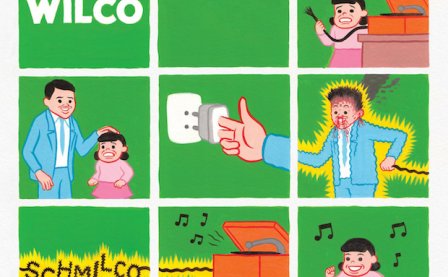Looking back, it’s entirely possible that music critics and listeners alike put too much stock in Yankee Hotel Foxtrot. That record, hailed both as Wilco’s breakthrough (true) and an infallible slice of American-made genius (more debatable), was and is still analyzed through a decidedly distorted lens. That the album was conceived and recorded long before September 2001 was of secondary importance in the minds of many who found a deep, if accidental, profundity in Jeff Tweedy’s blurred depictions of tall shaking buildings and general human malaise.
It was on their follow-up, A Ghost Is Born, that Wilco really hit their creative stride. A steadier and, I think, a more daring record than Foxtrot, Ghost’s coup de grâce was the heroic “Less Than You Think,” a three-minute piano ballad amended to include 12 minutes of spiraling synth noise. The band’s follow-ups, Sky Blue Sky and Wilco (The Album), seemed from the outset seat-fillers, a purging of front-brain material necessary to get to the good stuff: The Whole Love, Wilco’s finest outing in years and a charmingly imperfect set of songs that suggests a group free of the implicit pressures of expected greatness.
Despite his lauded status as a songwriter, Tweedy isn’t known as a generational spokesman. Unlike, say, Dylan, his lyrics are too inward-looking and abstract for such a designation. The Whole Love finds Tweedy coming as close as ever to reaching that cultural plateau, not because his sentiment is more general but because we as a society have grown so desperately confused. Tweedy’s lyricism here is apocalyptic (on the gorgeous “Black Moon,” he “Danced above the blaze/ Never stopped crawling/ Over the black dunes”) and characteristically lovelorn (on the title track, “I recall when you get mad/ I still love you to death/ I won’t ever forget how”), but it’s mostly feeling, vague imagery. Tweedy’s never been very concrete, and that’s still the case. It just happens that now the world’s caught up with him.
Indeed, the guiding concept of The Whole Love is that there is no guiding concept, save perhaps love, or the knowing and subsequent devastating absence thereof. It’s the depressive Tweedy’s favorite subject, and he explores it here with detached resignation. It would be kinda sad, except he doesn’t seem all that broken up about it these days. “I was born to die alone,” he sings on the excellent “Born Alone.” It’s a tragic celebration of solitude, the sunny side of defeat. In its way, the song is both fist-pumpingly triumphant and totally crushing.
In scope and style, The Whole Love often resembles Abbey Road; Tweedy’s obfuscatory lyrical universalism likewise almost seems a revision of Lennon & co.’s hallucinatory sagaciousness. One could even draw specific song parallels between the two records, namely “Sunloathe,” which recalls “Here Comes the Sun” in theme and sound, and the aforementioned “Born Alone,” which disintegrates from sunny guitar-pop into a hellish “She’s So Heavy”-style freefall that I wish would keep going forever.
But Wilco have one thing The Beatles did not: Nels Cline. A band member since the Ghost tour, the insanely talented Cline has evolved into the band’s biggest asset, the thing that sets them apart from everyone else. In fact, The Whole Love fails in not showcasing Cline quite enough; after his utterly scorching turn on album opener “Art of Almost,” Cline’s hyperdrive switch seems largely stuck in the “off” position. Still, he contributes some other notable highlights: the squealing melodic backbone of “Dawned on Me” (which itself sounds quite a bit like a Supergrass song) or the aching lap steel on “Black Moon.” The musical push-and-pull between the demure Tweedy and the volatile, visceral Cline is a joy to behold, and it actually serves to accent the rest of the band’s strengths, many of which were formerly overshadowed by Tweedy’s insistence on being the sole point of focus.
Near its end, the album seems poised to veer into Sky Blue Sky territory with a couple lightweight tracks, “Standing O” and “Rising Red Lung.” But the finale is a beaut: “One Sunday Morning (Song for Jane Smiley’s Boyfriend)” is the quietly overwhelming sound of grief put under a microscope, the sound of keeping it all in and finally letting it go. “I fell in love with the burden/ Holding me down,” Tweedy sings, finally comfortable and aware in his thickening skin. And that’s The Whole Love: a band come together, done throwing curveballs, comfortable in its own thickening skin. Wilco are just doing what they do best, and doing it better than ever.
More about: Wilco




